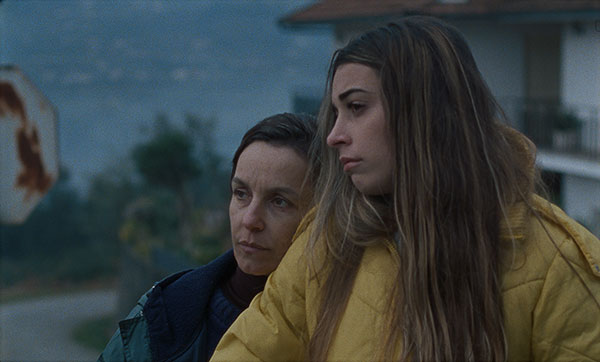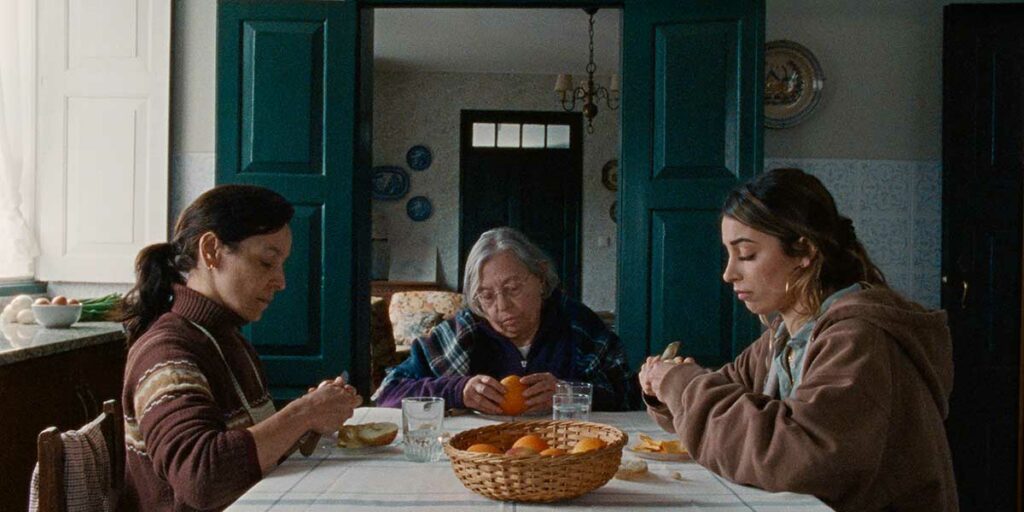Légua plays with our notions of time and death by taking a ghost story approach to a tale about women and their various roles in life.
Time is both a gift and a curse that reminds us of our past and holds us hostage for the future. We have seen plenty of stories that capture the different ways in which time is felt and how we change around it. And even if some do a better job than others, all of them have managed to depict how we cannot make time be still or go back a few minutes, hours, or years – the inescapability of growing old and re-experiencing memories. In recent years, this shot of remembrance and longing has been depicted in films that center around illness, specifically dementia or others that leave the elderly bedridden or needing continuous care because they can’t do it themselves. This is where Filipa Reis and João Miller Guerra’s latest work, Légua, is headed.
Named after the small village in northern Portugal, Légua is set at an old manor right between the mountains and forests. The dreamy and beautiful landscape casts a misty haze that will cause the character’s mindsets to change forever. The house owners are currently elsewhere, leaving it abandoned with dust on the shelves and leaves scattered in the doorway. It almost feels as if we are watching a ghost story of some sort, the manor serving as some kind of haunted house where equal amounts of beauty and horrors are lingering in each room. However, that sensation is quickly cast away, at least for the first few minutes of the film, as we see a woman named Ana (Carla Maciel) dancing to a Portuguese pop record playing on the radio.
Those moments of joy, even if it is a couple of seconds dancing by herself and embracing the vibey beats of the track, bring a smile to our face. But, sooner rather than later, these exact moments will be filled with a proximate dosage of bliss and melancholy. Her friend Emília (Fátima Soares) – the elderly housekeeper, who’s determined to keep the unoccupied house in order – is coming down with an illness that will break down her body. In order to help her, Ana takes on the mantle of caretaker. The seasons change around them, forming a cycle that keeps repeating itself, every time with a different cast. This time, it is Ana’s turn to face the severe effects of time and illness.

Ana always tries to keep her head high so that this situation doesn’t tear her apart. But, Ana’s relationship with her daughter, Mónica (Vitória Nogueira da Silva), is beginning to fracture, causing some mental wear and tear alongside the slowly gnawing pain of inevitable climaxes that life brings upon us. The three generations of women at the center of Légua’s story help the Portuguese filmmaking duo of Filipa Reis and João Miller Guerra reflect on how quickly life fades before your eyes and understand the question most people come across with: Where do I belong in this vast world? Although the film mostly centers around Ana and her relationship with Emília, you get three different perspectives that explore the aforementioned concepts, each one with a twist of its own.
Their age difference plays a big part, as you see the contrast in their lifestyles and contemplations. In Mónica’s viewpoint, you see the rebellious side of youth, which lives in the present, but fears the future – the equal balance between lively and reflective decision-making and thought process. Meanwhile, with Ana, there’s a sense of yearning for a past you can’t reach anymore. That’s why those moments of happiness, which aren’t many, have a double-edged sword of emotions. You feel the joy in her heart, albeit staggered by the constant reminder of time moving in uneven motions. On the other side of things, there’s Emília’s perspective, the most heartbreaking of all. At first, you see her being active, cleaning around the house with some pep in her step. Nevertheless, as the film (just like aging itself) takes its course, she is left incapacitated – unable to do her daily activities, in need of a person to look out for her.
Her glances pierce your soul, not only because of the palpable painful emotions transmitted by her performance (and the cast overall), but also due to being able to relate to such a situation. Most of us have, at least once, taken care of a loved one. And no matter the condition, whether on this scale or a smaller one, it gets a hold of you. My family and I have gone through similar situations, and it has left a scar on us; to this day, it still lingers in our heads. Of course, you don’t want to think about it much after they are gone. But, the memory comes back out of the blue when you hear or see someone going through it. Over the past couple of years, more so since Michael Haneke’s Amour (2012), more filmmakers have wanted to tell this type of story, all with different approaches.
Légua isn’t as manipulative as Gaspar Noé’s Vortex (his most mature work to date), nor does it contain the beautiful, grounded nuance of Mia Hansen-Løve’s incredibly touching One Fine Morning. Yet, the film’s arthouse inclination provides a unique touch and effectiveness to it. The directors experiment with our notions of death through equally stunning and haunting imagery, making it feel more like a transformation than a curtain closer. Almost every frame presented on-screen has a mirroring effect to it, one that arises from the narrative context and the other from a melancholic side, accompanied by the occasional Twin Peaks-like score by Ricardo Jacinto, Hypogeo Colorista Alessandro Pelliccia, as well as the sound work by Benoît Guérineau. A woman folding a white bed sheet as the wind blows seems like a ghost standing still. A rave sequence turns into a transcendence from life to death.
Although I don’t think the directors intended that all images conjured that sensation upon the viewer, it still haunts you: it makes an impression and leaves you cold for a couple of seconds. I may be seeing a very different angle that many other viewers might not pick upon. But that’s the beauty of cinema. That’s one of the reasons why this film ends up working in the first place. There’s much to uncover in Légua’s poetic language, that there will be many interpretations behind the various meanings in each frame. And I hope that international cinema lovers will gather to see this fascinating picture and feel its unnerving yet hopeful power upon official release.
Légua premiered at the Cannes Film Festival on May 24, 2023, as part of the Quinzaine des Cineastes. Read our list of 20 films to watch at the Festival de Cannes and take a look at our other reviews and our recommendations of must watch movies.

